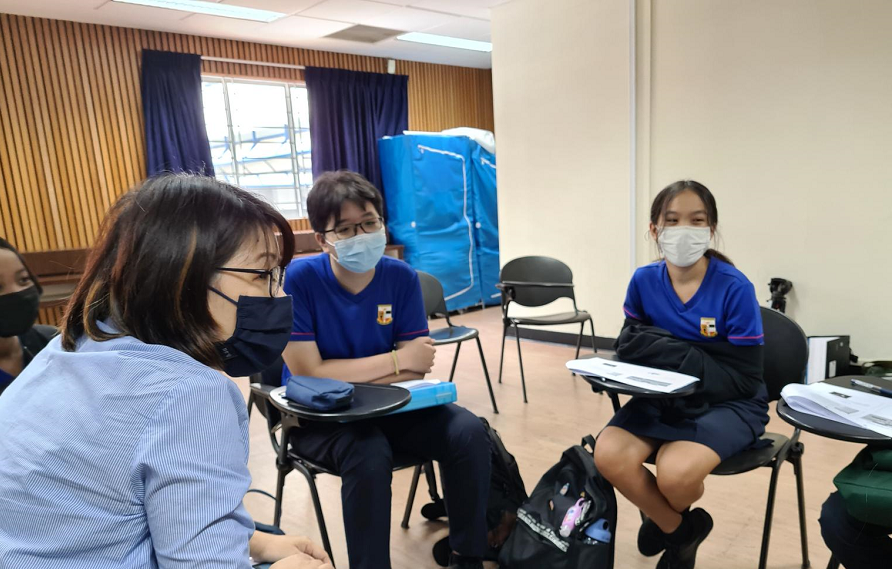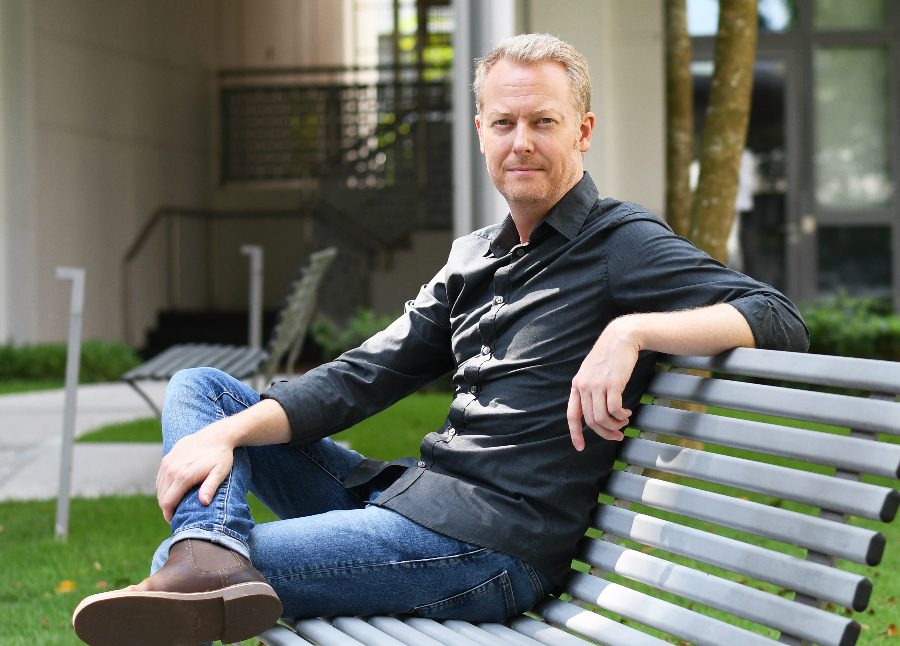Last year, a classmate sent an anxious text to Secondary 3 student Nur Aleya Syahira Binte Mohamad Asek, hoping they could speak in the morning before school. They met and sat together as the classmate cried with anxiety about her studies. Aleya tried to understand her challenges and realised that her classmate was doing well enough in class but needed assurance of it. She empathised with her feelings, advised her to take scheduled breaks to moderate her stress, and offered to meet for a chat whenever she needs.
On another occasion, a Secondary 2 boy was mocked by his classmates for not being able to dribble a basketball during PE. He approached classmate Janathakesh s/o Mahindran to express his frustration. Janathakesh listened to him, guided him to calm down and advised him to inform a teacher should the others tease him again.
Aleya and Janathakesh are Serangoon Secondary School’s Peer Support Leaders (PSLs), a new crop of students who are selected and trained to render help to their classmates, doing what a BFF (or ‘best friend forever’) might do in times of need.
The introduction of PSLs is part of the Ministry of Education’s broader efforts to build a caring and supportive school culture in Singapore and comes with the implementation of peer support structures in all schools — from primary schools all the way to institutes of higher learning. This is in recognition of how students often prefer to turn to their friends and peers for help before they approach adults.
The move goes hand in hand with a refresh of the Character and Citizenship Education syllabus this year to equip all students with skills to recognise signs of distress, and how to seek help and provide a listening ear so that every student can be a peer supporter.
Serangoon Secondary School started its programme for peer supporters in 2019; by the end of 2021, all schools will have PSLs.
Bring on the CHEER
PSL duties focus on three main areas: peer bonding, peer helping, and peer influencing.
They organise bonding activities to engender a sense of belonging among their peers, and actively look out for others who may be lonely, isolated and/or distressed. They also offer support and advocate for healthy relationships both online and offline.
Here is how PSLs fill a necessary gap as a CHEER-leader to provide help and support for their peers:

Steps in the CHEER framework guide PSLs on how they can better support their classmates.
For Aleya and Janathakesh, for example, they were approached because their classmates felt their issues were not pressing enough to raise to a teacher but they needed a listening ear, on anything from conflicts with friends to family issues. Knowing that the sharing is informal and held in confidence also helps them to open up; PSLs are advised to surface issues with their teacher as a trusted adult for additional help when there are well-being and safety concerns.
It is a big responsibility to be a PSL, but at Serangoon Secondary School, all student leaders work together and complement one another’s efforts — Class Chairpersons focus on class discipline and management and help cultivate a positive class community, while Prefects focus on fostering school spirit, organise school events and are involved in school discipline.
At the school, form teachers nominate one PSL per class at the start of each year, based on qualities which include being approachable, reliable, empathetic, inclusive and encouraging; the names are approved by a team of staff. PSLs are appointed for two years and wear a badge so other students can identify them easily.
Handling bullying and other concerns
It is not enough to just be of a pleasant and helpful disposition; PSLs need the skills to support their classmates. Serangoon Secondary School runs hour-long training sessions that span these topics:
- understanding emotions
- spotting signs of distress
- help-giving skills
- understanding hurtful behaviour, and how to be an upstander
- strategies for calming down
- active listening skills
- inclusion and exclusion
- peer mediation
- mental health
- self-care.
Each session is helmed by a teacher, with several others helping to facilitate smaller group discussions and roleplays.
The training is robust. When hurtful behaviour is covered, for instance, PSLs are invited to consider tough questions like: Are being rude, being mean, teasing and bullying the same things? What kinds of bullying are there, and which is the hardest to spot? How can they intervene if they witness a situation which puts a classmate in distress?
The PSLs are also given tips on how to assist classmates who are experiencing difficult emotions. They could use breathing exercises to help them calm down. Or grounding techniques to bring their minds to the present. And sometimes, it helps to just offer a piece of tissue, or sit quietly and be there for their friends.
Is it difficult to juggle such responsibilities with one’s studies? PSL Kate Lau and Class Vice-Chairperson Kris Toh, who attended PSL training sessions, do not think so. They are just glad to be of help to their peers, and also feel supported by their teachers who check in on them regularly, ensuring their well-being and guiding them on how to exercise self-care.
Said Kate, “I feel grateful that I have such supportive teachers who are always looking out for me,” and Kris chimed in, “I feel that they’re always there for us, no matter the situation.”
Janathakesh added, “They also suggest ways for me to manage my feelings, often ask about my well-being, and remind me to have sufficient rest. They would always tell me to handle things in a calm and composed manner.” PSLs are also guided by teachers not to solve their friends’ problems but to extend help by reaching out to a trusted adult.
At the end of the day, they are honoured to play a significant role in their classes. As their Senior School Counsellor Mdm Jade Chee puts it, PSLs can bring some CHEER and support to their peers and are in a position to have a positive influence on their schoolmates.






